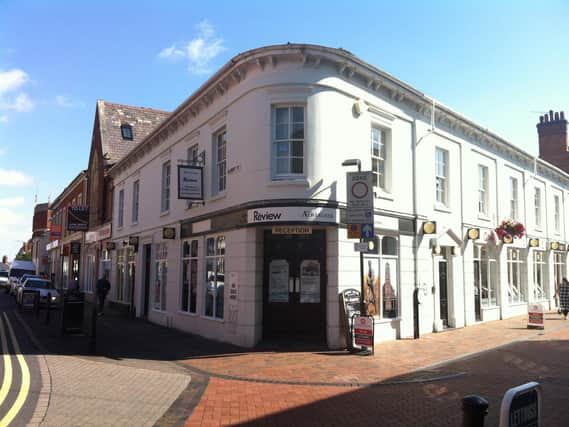'We don’t really want that sort of thing at the Rugby Advertiser' - when beards and long hair were frowned upon


Around this time of year we start to contemplate the looming arrival of shortening days and the darker evenings.
Once we get August under our belts, the die does seem to be cast… summer and all its pageantry will soon be just a memory.
Advertisement
Hide AdAdvertisement
Hide AdYou will recall that much of July was very hot, and although foreign travel seemed too much hassle for many of us, thanks to chop and changing Covid regulations, my family and I did manage to enjoy some good old British seaside breaks.
On one trip, we stayed with friends in Taunton, Somerset. During one particularly hot day, I was surprised to see small groups of children and teenagers happily splashing about in the nearby River Tone, evidently having the times of their lives.
And didn’t the memories coming flooding – sorry, pun intended – back.
Not long ago, I wrote a Memory Lane piece about the Avon Mill baths and how Rugby youngsters used to flock there during the summer months.
Advertisement
Hide AdAdvertisement
Hide AdMind you, that was just one place where the town’s more amphibiously inclined youth could be found in those days. Many of us will recall that we had a much less risk-averse society back then, which is why no one took a second glance at the sight of boys and girls cooling off in the Avon and Newbold Quarry.
In my case, it was the River Swift where the aptly named Bather was more than a match for the French Riviera, not that any of us knew what that was, of course.
Now, the other thing I noticed about these youngsters was that nearly all of them had long hair. Was I caught up in some kind of time warp?
Many of you will not only remember the days when the locks of young men often hung way over their collars, but perhaps also recall a few follicular indiscretions themselves.
Advertisement
Hide AdAdvertisement
Hide AdCome on, there’s no point in denying it. You know full well that deep down in that drawer, there will lurk a truly embarrassing black-and-white wedding photo that bears witness to a certain person’s inability to see into a future when shaved heads would be the ultimate sign of masculinity.
And by the way, I’m just as guilty as the rest of you. Photographs taken at my first wedding bear witness to the possession of a hirsute helmet that came complete with sideburns which hung like hairy stalactites to the side of my face.
Some of you will also recall that quite a few employers weren’t all that happy with the well-thatched look. When I was a junior reporter on the Rugby Advertiser, I was occasionally pulled up about hair length and various facial adornments.
Back in the 1960s, manager John Rogers was in overall charge of the building in Albert Street. One day, passing me in the corridor, he paused, turned and said: “Oh dear. I see you’ve joined the bearded brigade, Mr Phillpott. We don’t really want that sort of thing at the Rugby Advertiser, do we?”
Advertisement
Hide AdAdvertisement
Hide AdUnsurprisingly, the beard soon vanished. And no, I didn’t coat it with cream and allow a cat to lick it off, thank you.
In my case, it’s one of life’s crueller ironies that what were once verdant forests are now mainly parched plains, with only the occasional oasis to be found, mainly at the sides.
As if to rub it in, the founding fathers of the long hair movement, the surviving Beatles and Stones, still boast reasonable heads of hair, whereas countless thousands of their original male fans most certainly can’t say the same.
Nevertheless, there were a number of jobs where long hair was most definitely frowned upon. If you worked in a bank, building society, or in any calling that required a collar, tie and suit, then it had to be a relatively short crop.
Advertisement
Hide AdAdvertisement
Hide AdThis seems to have changed as the 1960s melted into the 1970s. Perhaps the older generation’s will to resist the relentless tide of youth culture had diminished.
That must have been the case to some extent, because I can remember working with a reporter on the Leamington Spa Courier whose centre- parted mane was so long it cascaded over his shoulders.
But even at that time, I sometimes wondered what the paper’s readership would have made of him when he called at their house to interview them about a golden wedding or some sporting success.
But we shall return to that river bank. Attitudes to what’s now known as ‘wild’ swimming have changed a great deal since the days of my youth.
Advertisement
Hide AdAdvertisement
Hide AdThese days, bathing in rivers, lakes and quarries is now generally discouraged by the police and other agencies. Here in my adopted city of Worcester, the police will always take action if they see anyone taking a dip in the Severn, an unpredictable, highly volatile river that claims several lives every year.
But be that as it may, we lived to tell the tale, didn’t we? Not quite so sure about the survival of the hair, though.
John Phillpott’s book Beef Cubes and Burdock, a memoir about growing up in Churchover, is available from bookshops and the publishers, Austen Macauley.